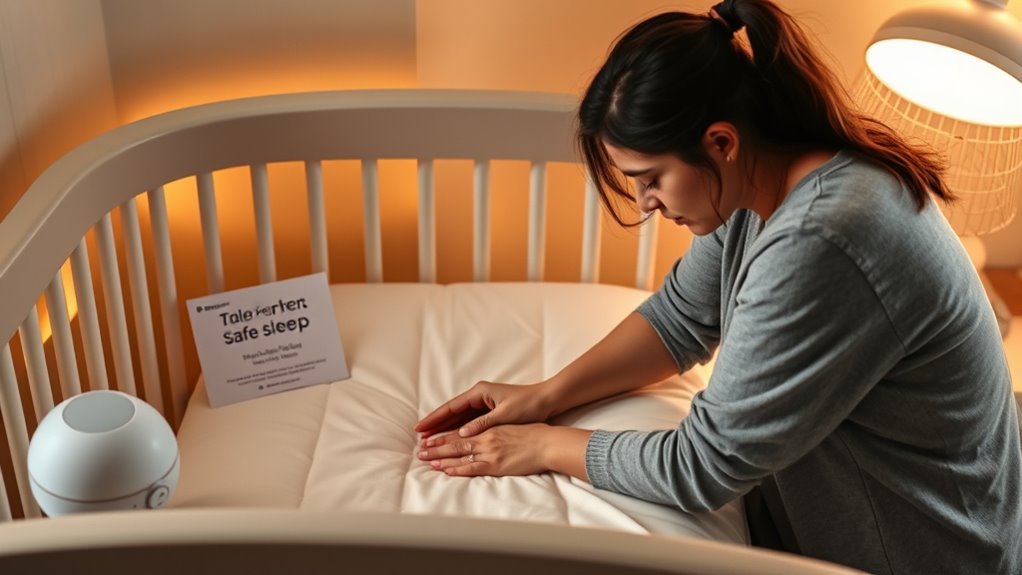To improve sleep as a caregiver, establish a consistent routine by going to bed and waking up at the same time each day, and set relaxing bedtime rituals like reading or warm baths. Create a calming sleep environment with blackout curtains, a cool temperature, and supportive bedding, while using relaxation techniques such as deep breathing or gentle stretching. Prioritize self-care, seek support, and consult healthcare providers if needed. For more practical strategies, keep exploring ways to rest better each night.
Key Takeaways
- Establish a consistent sleep routine and bedtime rituals to signal your body it’s time to rest.
- Optimize your sleep environment with blackout curtains, comfortable bedding, and proper room temperature.
- Incorporate relaxation techniques like deep breathing, meditation, or warm baths to reduce stress before sleep.
- Prioritize self-care and seek support through caregiver groups or professional counseling to manage exhaustion.
- Follow safe sleep strategies and consult healthcare providers for persistent sleep difficulties or underlying issues.
Establish a Consistent Sleep Routine

Establishing a consistent sleep routine is crucial for exhausted caregivers to improve their sleep quality. A regular sleep schedule helps regulate your internal clock, making it easier to fall asleep and wake up refreshed. Creating a bedtime routine, like reading or taking a warm bath, signals your body that it’s time to wind down, supporting better sleep hygiene. A clutter-free space can also contribute to a more relaxing environment, enhancing your ability to fall asleep peacefully. Consistency in sleep patterns reduces nighttime awakenings and can lessen the effects of sleep deprivation. Additionally, creating a calibrated environment can help optimize your sleep conditions for better rest. To further enhance your ability to relax, consider incorporating flexibility and mobility exercises into your routine, as they promote overall wellness and can lead to better sleep. Engaging in music therapy can also be beneficial as it enhances emotional well-being, providing a soothing backdrop to your bedtime routine.
Maintaining regular sleep habits not only enhances sleep quality but also fights caregiver fatigue by promoting restful sleep. When your sleep routine is predictable, your overall sleep duration improves, helping you feel more energized and resilient. Additionally, quality sleep enhances cognitive function and emotional regulation, which are essential for caregivers managing daily challenges. Prioritizing a consistent sleep schedule is an essential step toward combating exhaustion.
Create a Restful Sleep Environment

Creating a sleep-friendly environment is essential for exhausted caregivers to get restorative rest. Start by making your room dark with blackout curtains or a sleep mask to block out light, which supports better sleep quality.
Keep the room temperature between 60-67°F (15-19°C) to promote deeper rest. Use quiet surroundings by adding earplugs or a white noise machine to drown out disruptive sounds. Additionally, consider using an air purifier with HEPA filtration to reduce allergens and improve overall air quality in your sleep space. Proper ventilation can also enhance sleep quality by ensuring a consistent flow of fresh air, similar to how RMDs can enhance financial stability in retirement. Moreover, implementing automation in business intelligence can help caregivers manage their time better, allowing for more opportunities to rest. A well-designed sleep environment can significantly improve your rest, just as camper conversions can enhance your travel experience.
Invest in comfortable, supportive bedding and a quality mattress to reduce physical discomfort. Limiting exposure to screens and bright lights before bed helps regulate your circadian rhythm, making it easier to fall asleep.
Proper light control and maintaining an ideal room temperature create an ideal sleep environment, helping you wake up feeling refreshed and ready for the day. Additionally, using professional equipment in your sleep space, such as sound machines, can enhance the overall atmosphere for better rest.
Incorporate Relaxation and Stress-Reducing Activities

Incorporating relaxation and stress-reducing activities into your bedtime routine can make a significant difference in your sleep quality. These activities help you unwind and promote mental relaxation, easing the shift into restful sleep.
Try these techniques:
- Practice deep breathing, meditation, or gentle stretching to activate your relaxation response. Research shows that nighttime meditation can improve sleep quality.
- Listen to calming sounds, music, or nature noises to foster stress relief and calm your mind.
- Take a warm bath or drink warm milk to physically relax your body and lower anxiety levels.
- Incorporate mindfulness, prayer, journaling, or visualization to release worries and create a peaceful mental state. Additionally, consider using essential oils for relaxation to enhance your calming routine.
Prioritize Self-Care and Seek Support

Prioritizing self-care and seeking support are vital steps for caregivers to maintain their well-being and prevent burnout. Taking time for self-care helps you manage caregiver stress and promotes better rest. Incorporating positive thinking strategies can also enhance your ability to cope with daily challenges. Engaging with reliable resources can provide you with additional strategies to navigate early parenthood successfully. Additionally, understanding the importance of self-care practices can significantly improve your overall health and resilience. Exploring family-friendly options like local events or activities can also provide a much-needed break.
Setting boundaries ensures you don’t overextend yourself, protecting your long-term health. Support from family, friends, or respite care offers essential relief, giving you time to recharge.
Utilizing resources like caregiver support groups or professional counseling provides emotional support and practical advice, strengthening your resilience. Engaging in activities that promote stress management, like hobbies or relaxation techniques, improves your overall well-being. Additionally, understanding the importance of data analytics can empower you to track your own well-being and identify areas needing attention.
Use Safe Sleep Strategies and Medical Resources

To improve your sleep quality as a caregiver, focus on safe sleep strategies and leveraging medical resources. Creating a dark, quiet, and cool sleep environment can considerably boost your sleep and reduce disturbances. Additionally, ensuring that your sleep environment is free from cybersecurity concerns, such as unsecured devices, can help you relax better during the night. Establishing a consistent sleep schedule, similar to retirement savings plans, can also promote better sleep hygiene.
Consult healthcare providers about sleep issues; they can recommend insomnia treatments like CBT-I or medications tailored to your needs. Use medical resources such as the MSK Caregivers Clinic or integrative medicine services for personalized sleep management. It is important to consider ethical hacking practices to protect your personal information while utilizing online resources.
Additionally, follow safe sleep practices by keeping sleep aids out of reach and avoiding suffocating bedding, especially for loved ones with sleep or cognitive issues. Reliable online tools, like NIH’s “Your Guide to Healthy Sleep,” also offer evidence-based tips. Incorporating integrative medicine services can further enhance your overall well-being and sleep quality.
Combining these strategies enhances caregiver support and promotes healthy sleep.
Frequently Asked Questions
How to Deal With Caregiver Fatigue?
You can deal with caregiver fatigue by prioritizing your well-being. Take regular breaks, ask for help when needed, and delegate tasks to others.
Establish a consistent sleep routine and create a calming environment to improve your rest.
Recognize early signs of exhaustion, and don’t hesitate to seek support from friends, family, or professionals.
What Are Signs of Caregiver Burnout?
You might notice signs of caregiver burnout through emotional exhaustion, irritability, or feeling overwhelmed. Physical symptoms like fatigue, headaches, and sleep problems are common.
You may also withdraw from social activities or feel increasingly anxious and depressed. Recognizing these early warning signs helps you take steps to prevent long-term health issues.
If you notice these signs, it’s important to seek support and prioritize your well-being before burnout worsens.
What Is the Caretaker’s Syndrome?
Caretaker’s syndrome, or caregiver fatigue, happens when your physical, emotional, and mental energy become overwhelmed from constant caregiving. You might feel irritable, exhausted, and struggle to focus, while your health declines due to stress.
It’s common among dementia caregivers.
To prevent it, you need support, rest, and stress management.
Recognizing these signs early helps you take steps to protect your well-being and avoid long-term health issues.
How Long Does It Take to Recover From a Caregiver Burnout?
Recovery from caregiver burnout varies, but you can expect to see improvements within 4 to 6 weeks if you prioritize self-care, reduce stress, and seek support.
It may take longer if burnout has been prolonged or severe. Consistent routines, professional help, and adequate sleep speed up healing.
Conclusion
Remember, caring for yourself is just as important as caring for others. By establishing routines, creating a calming environment, and seeking support, you can improve your sleep quality. Did you know that 60% of caregivers report sleep problems? Prioritizing self-care isn’t selfish—it’s essential. Take small steps today to rest better tomorrow, so you can stay strong for those who depend on you. Your well-being makes all the difference.









